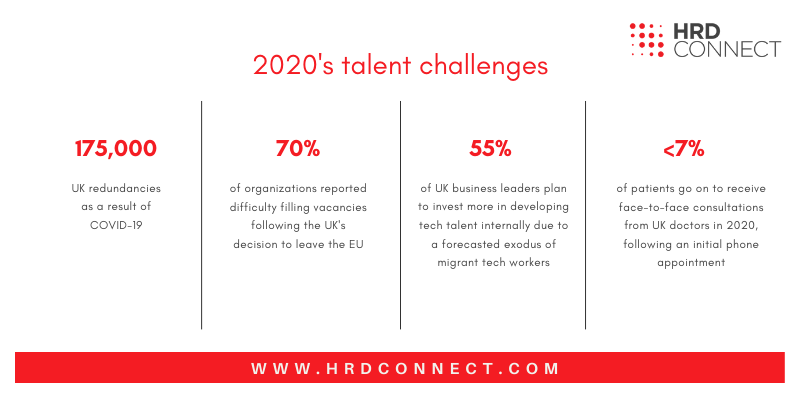HRD Deep Dive: The post-2020 talent landscape
- 7 Min Read
The talent space can be particularly volatile, but with COVID-19 and Brexit coinciding in 2020, the difficulty has reached unprecedented levels. With the particular complexity of this situation, we’ve unpacked the main points and provided a full run-down for HR and business leaders looking to pivot their post-2020 talent strategies.
- Author: Sam Alberti
- Date published: Aug 13, 2020
- Categories

Since 2016, the United Kingdom has been faced with what is arguably the most significant political and economic spectre for generations; a scenario engineered by the nation’s own hand, but one that could irreparably damage industry, trade and the economy at large; a decision that subsequently sparked a political saga so arduous and disorienting that one could scarcely recall the original motive. Sound familiar?
The scenario in question is of course Brexit; a phenomenon that threatens to turn the business world upside down by shrinking the supply of skills and labour from EU territories, and provoking the exodus of many others.
But ironically, the outbreak of COVID-19 has contrived to divert the world’s attention entirely, sparking its own set of talent challenges.
Most notably, the standstill of many economic sectors and subsequent loss of revenue has generated widespread redundancy (now over 175,000 in the UK). As a result, HR leaders will be forced to rethink when it comes to their post-2020 talent retention and acquisition strategy.
The fear now, is that these two issues may become more than the sum of their parts. The United Kingdom has now entered into recession for the first time since 2009, following the economy’s biggest slump on record. What’s more, the country now finds itself just four months away from crashing out of the EU with no deal.
For HR and business leaders, this begs the simple question: what now?
Brexit and talent – what’s changed?
Unsurprisingly, much of the Brexit malaise revolves around talent shortages. According to The Migration Observatory at The University of Oxford, roughly 17% of the UK’s employed population were born abroad. Figures also show that, among men, migrants are more likely to be employed than natives (83% vs 79%).
This creates an impasse that almost speaks for itself, and has sharply affected both retention and acquisition. CIPD’s Labour Market Outlook report (Autumn 2018) speaks volumes, showing that over 1/3 of employers reported greater difficulty in retaining staff over the 12 months prior.
Equally, the report shows an increase of around 4% in organizations that reported open vacancies and recruitment difficulties – now up to roughly 7/10.
This spells danger for the future of talent, business longevity, and ultimately GDP. The fear is that a longstanding, post-2020 talent shortage will result, with workers leaving the country at a greater rate than entering.

But the issue extends beyond talent in the general sense. Shortages are also forecast when it comes to highly skilled and technical workers.
Salesforce addressed this issue in its Global Britain report published last year. The report noted that 52% of UK business leaders believe the country is at risk of a “tech brain drain”; i.e, a shortage of tech talent.
It went on to show that, as a result, 55% of UK business leaders plan to invest more in developing tech talent internally. Salesforce also found that these efforts will extend to less common demographics; 55% of business leaders pledged to address the skills gap by reskilling older generations, and 51% said they intent to do more to reskill people from disadvantaged backgrounds.
Finally, it should be noted that the sheer uncertainty and discontent of Brexit has also made its mark on the talent space, and there is a growing consensus that this could impact retention.
For instance, one survey conducted during the build-up to Brexit found that nearly 50% of respondents cited reassuring candidates as one of their biggest challenges in navigating through the disruptive period.
As the UK’s 11-month transition period draws ever closer to an end, HR and business leaders must consider how these issues will impact their organizations, and how they will attempt to square this with the COVID-19 mire.
COVID and talent – what’s changed?
The global pandemic has shaken the entire business world to its core, and as is often the case, the talent space has been hit particularly hard. In addition to the UK’s political nadir, COVID-19 has given HR and business leaders another cause for concern.
With businesses pivoting their strategies to overcome the changing conditions, much of this scenario comes down to acquiring the right skill-sets. In fact, even before the pandemic, organizations were having to consider how they could move forward in tandem with changing technologies and the data revolution.
However, compounding this issue is the fact that talent shortages were already at an all time high prior to the pandemic, with 54% of companies complaining of not being able to find enough skilled applicants to meet demand.
McKinsey addressed this in a report published earlier this year, using the phrase ‘the distance economy’ to demonstrate the drastic change in remote processes among organizations. The report notes than in 2019, less than 1% of UK doctor’s appointments took place via videolink, whereas now, doctors assess 100% of patients by phone, and less than 7% go on to receive face-to-face consultations.
This is just one example of the countless processes that are being rethought as a direct result of the pandemic. The growing consensus is that many will become permanent fixtures, meaning that workers will need to demonstrate new or improved skills on a day-to-day basis. As a result, recruiters and talent leaders will now need to apply more careful consideration when it comes to post-2020 talent acquisition and management.
Equally, as with Brexit, the discontent being generated by the pandemic is causing further difficulty when it comes to retention and acquisition. Not only are workers and candidates less likely to make commitments during a global crisis, but the change in strategies, processes and culture is thought to be a major catalyst for disengagement among employees.
For instance, a Deloitte study earlier this year found that 66% of those who plan to leave their organizations also reported ineffective communication in the workplace.
Needless to say, these are real and pervasive challenges that are having a major impact on organizations. What’s more, it’s perfectly possible that these changes could alter the complexion of the post-2020 talent space entirely, and for years to come.
How can HR leaders react?
Though 2020’s talent challenges are complex and multi-faceted, one thing is for certain; leaders must now be prepared to pivot in order to change with the times.
If we step back and look at how both Brexit and COVID-19 have affected talent, one key theme that stands out is reskilling and upskilling.
With retaining top talent looking to be a more challenging task than before for various reasons, and new processes being implemented with each passing day, it simply isn’t possible for organizations to remain inert.
For this reason, learning and development initiatives have become something of a no-brainer for HR leaders. This is a key theme to consider post-2020 in order to avoid being left behind.
Culture and engagement is the other central issue when it comes to post-2020 talent.
Brexit and COVID have once again displayed similarities in terms of how they’ve generated uncertainty and turned the business world on its head.
One side of the coin is that employees have become naturally disengaged due to the changing circumstances. The other is that many organizations have slipped into bad habits during transition, allowing areas such as communication and company culture to slip.
One study even found that 38% of workers became frustrated and disengaged due to anxiety caused by the introduction of new processes.
From this, the task for HR and business leaders is clear: when it comes to post-2020 talent strategy, delivering on your employer brand and delivering an engaging employee experience is crucial.








